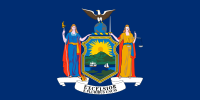Alcohol laws of New York: Difference between revisions
Added sections on drunk hunting and public intoxication |
No edit summary |
||
| Line 40: | Line 40: | ||
[[Category:Alcohol law in the United States]] |
[[Category:Alcohol law in the United States]] |
||
[[Category:New York law]] |
[[Category:New York law]] |
||
[[Category:Article Feedback Pilot]] |
|||
Revision as of 18:05, 6 March 2011


This article needs additional citations for verification. (April 2008) |
The alcohol laws of New York are among the most lenient of any state in the Atlantic Northeast of the United States, but they remain considerably more restrictive than those of Louisiana, Missouri (see alcohol laws of Missouri), Nevada, Illinois, New Mexico, and Arizona.
State Liquor Authority
The serving of alcohol in the State is ultimately governed by the State Liquor Authority which issues licenses and permits for the manufacture, wholesale distribution and retail sale of all alcoholic beverages; and regulates the trade and credit practices related to the sale and distribution of alcoholic beverages at wholesale and retail levels.[1]
For consumption on-premises
In New York, for the purposes of state law, there are only four hours out of each day of the week in which alcohol may not be served: 4:00 a.m. to 8:00 a.m. This was designed to accommodate New York City nightlife as well as late night workers statewide in general. Some upstate areas such as Buffalo, Albany, and Saratoga Springs retain the 4am closing time although individual counties are free to set an earlier "last call." In Binghamton, this is at 3:00 a.m., in Syracuse, Plattsburgh, Oneonta, and Rochester, bars close at 2:00 a.m., and Elmira, Geneva, and Ithaca, have some of the earliest closing times in the state at 1 a.m.
Drinking age
In response to the National Minimum Drinking Age Act in 1984, which reduced by up to 10% the federal highway funding of any state which did not have a minimum purchasing age of 21, the New York Legislature raised the drinking age from 19 to 21, effective December 1, 1985. (The drinking age had been 18 for many years before the first raise in 1982.) Persons under 21 are prohibited from purchasing or possessing alcohol, from consuming alcohol in public (though they may do so in the privacy of their own homes with consent of a legal guardian), or from having a blood alcohol level of more than 0.02% while driving.
Drunk driving
Like every other state in the United States, driving under the influence is a crime in New York, and is subject to a great number of regulations outside of the state's alcohol laws. New York's maximum blood alcohol level for driving is 0.08% for persons over the age of 21 and there is a "zero tolerance" policy for persons under 21. Minors caught with any alcohol in the blood (defined legally as 0.02% or more, presumably to avoid false positives) are subject to license revocation for 6 months or more. Other penalties for drunken driving include fines, license suspension/revocation, and possible imprisonment, and in some cases the implementation of an ignition interlock device. A lesser charge, driving with ability impaired (DWAI), may apply when a driver's BAC exceeds 0.05%.[2]
Hunting Under the Influence
Hunting while under the influence of drugs or alcohol is also illegal in New York State. This law is in place to protect other hunters and others in the area from the poor judgment of an intoxicated hunter. Anyone under suspicion of hunting while intoxicated will be subjected to a breath test and, if that’s positive, further chemical tests. Hunting while intoxicated is a misdemeanor, punishable by imprisonment in a state penitentiary or county jail for up to one year, by a fine less than $500, or both. In addition, you stand to lose your hunting license or permit for a period of up to two years.
Public Intoxication
New York State has no law against being intoxicated from alcohol in public, but there is a law prohibiting other substances. Any person found under the influence of a substance other than alcohol in public who is endangering themselves and others is guilty of New York State Penal Code. This also applies to those found under the influence and bothering others or damaging public or private property. In addition it is illegal to have an open container of alcohol on a public sidewalk, road or park.
